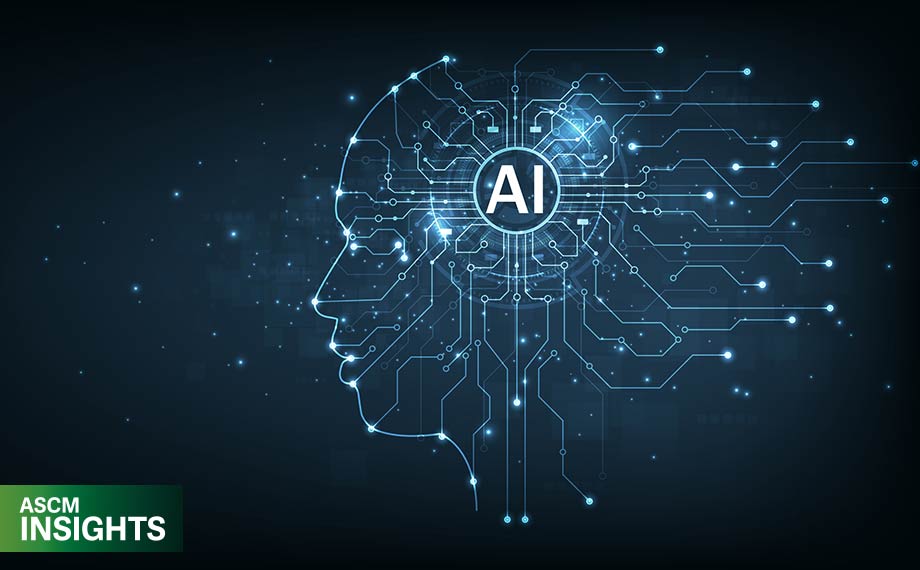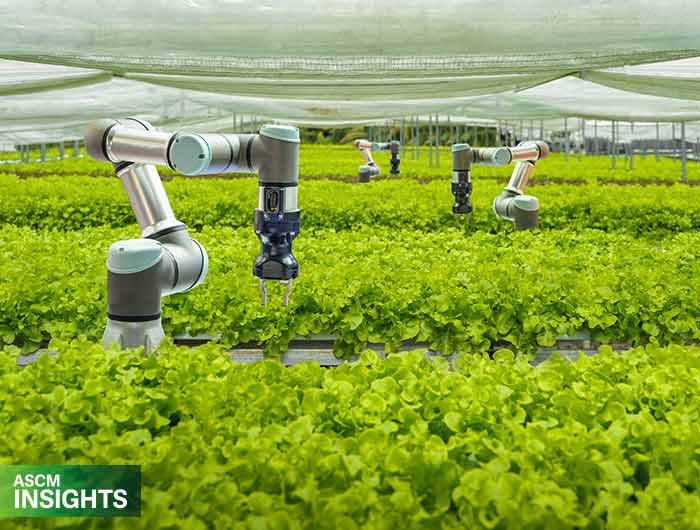AI continues to be a hot topic, and it’s becoming increasingly valuable in supply chain management. In fact, AI earned the number-three spot on ASCM’s Top 10 Supply Chain Trends in 2024, spotlighting advances happening at an unprecedented rate and offering many immediate benefits. To simplify what you need to know to use AI successfully, here’s an ASCM Insights Blog roundup of seven key takeaways for supply chain professionals.
1. There’s no need to fear: AI has been around — and we’ve been using it — for a long time. The concept of AI has been around for more than 70 years, since Alan Turing published "Computing Machinery and Intelligence" in 1950, which ultimately set the stage for AI. In the 1960s, MIT developed Eliza, basically a chatbot that could have human-like text conversations. Eliza is an early ancestor of the chatbots commonly used today for online customer service. Voice-based AI assistant Siri has been around for more than 13 years, and Amazon’s Alexa turns 10 this year.
Other types of AI were developed to be very good at a specific task, like winning at chess or “Jeopardy!” This is the kind of AI that is most commonly integrated into supply chain and manufacturing environments to automate a specific, repetitive task and free humans to do more complex work.
Professional and pedestrian users alike have learned how to use these tools in ways that make the most sense in their work and personal lives. The latest hype is tied to the launch of ChatGPT, Google’s Gemini and other generative AI tools in late 2022 and early 2023. Generative AI is AI that can produce or generate some type of output, such as text, images or music. While new, it’s not too different from the AI we’re already accustomed to using.
Learn more: 5 Ways AI is Becoming Essential to Supply Chain
2. AI is more than chatbots. AI tools go beyond virtual assistants. They can optimize a variety of complex tasks, such as forecasting, evaluating a long list of suppliers and making decisions based on data. AI powers autonomous robots and drones, augmented reality tools, digital twins and process automation tools. It can also take over some of our least-favorite jobs. IBM invented an AI system that cycle counts, which Quentin Samelson, senior managing consultant at IBM Consulting, admitted in an ASCM webinar is one of his human team’s least favorite tasks. With the help of a camera pushed on a cart or attached to an autonomous drone or robot, the AI system visually inspects picking locations to determine whether they are empty. The technology also visually inspects facility fire extinguishers to ensure they are placed where they should be and they contain all the proper external parts.
Learn more: Optimize Your Supply Chain with AI and ML
AI Continues to Inspire Innovation in Supply Chain
3. AI is not going to take your supply chain job — but will likely change it. Yes, some jobs will become obsolete with AI use increasing, but new jobs will appear in support of AI tools. In fact, 50% of surveyed companies expect new jobs will be created as a result of their adoption of AI. Most of these will be higher paying, safer and more fulfilling. It’s seeming more and more evident that the supply chain professionals who need to worry are those who do not embrace AI.
Learn more: How AI Will Enhance Supply Chain Careers
4. AI requires research. Figure out how adopting AI makes the most sense for your company or operation. Build a portfolio of use cases that show how it will benefit your supply chain, especially in areas such as route optimization, sales forecasting, product categorization, safety stock calculations, supplier management and warehouse management. Also consider future uses. Then, take a careful look at the expected return on investment from each implementation option, and prioritize your AI implementation goals based on that.
Learn more: How to Outsmart AI Business Challenges
5. AI relies on massive amounts of good data. You’re also going to need lots of high-quality data to get started. According to ASCM’s Artificial Intelligence and Machine Learning microlearning, this data can come from an enterprise resource planning system, a warehouse management system, financial records, business directors, weather data and more. Ensure whatever data you use is relevant, accessible, accurate, complete, up-to-date and reliable.
Data readiness is a major challenge for any AI project, as only 3% of a company’s data typically meets basic quality standards. One approach is to focus on gathering a smaller amount of quality, relevant data — rather than just a large volume of data — to start with and then enrich the data pool as new data becomes available. More data ultimately will help AI make more accurate decisions and in turn be more useful to you.
Learn more: Optimize Your Supply Chain with AI and ML
6. There is plenty that AI still isn’t good at. AI is still learning and developing — not unlike humans. But as a newer technology, it has a lot more to learn. Right now, the technology is prone to hallucinations, or generating content that has factual or reasoning errors. Therefore, humans need to review outputs before acting on them. If companies fail to do this step, they could face significant financial and operational consequences. It is best to limit AI use to back-office activities at first until you feel confident your tool can be a reliable asset.
Learn more: Will Generative AI Revolutionize Supply Chain?
AI and the Supply Chain: An Interview with MIT’s Yossi Sheffi
7. People are the real power behind AI. The human brain is still the most complex thing in the universe. Likewise, the human touch is an essential element of successful use of AI. Unfortunately, it can be difficult to find experts on effective use of the technology. The best and most cost-effective strategy is to upskill internal candidates to fulfill new AI roles.
Learn more: Optimize Your Supply Chain with AI and ML
How One Agriculture Startup Plans to Use AI to Prevent Food Shortages



